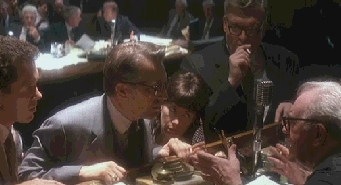The JFK 100
Judge Haggerty and Officer Habighorst

Jim Garrison (Kevin Costner) argues with Judge Edward Haggerty (John Finnegan)

Jim Garrison (Kevin Costner) argues with Judge Edward Haggerty (John Finnegan)
Is this the way things actually happened?Habighorst, the clean-cut police officer who booked Clay Shaw on the day of his arrest, starts forward.GARRISON Your Honor, I call police officer Aloysius Habighorst to the stand.
This is an ugly surprise for Jim. We see him at the bench arguing loudly with the judge. Susie [fictional investigator "Susie Cox"], [Irvin] Dymond and Al [Oser] are also there.JUDGE HAGGERTY I'm going to have to ask the jury to leave the courtroom.
GARRISON What?
FLASHBACK TO 1967, in the New Orleans police station. Shaw is being booked. The press is there and Habighorst is questioning him.JUDGE HAGGERTY I'm sorry, Jim, but the defendant did not have his lawyer present when asked.
We see a close-up on Habighorst typing this in.HABIGHORST Any alias?
SHAW Clay Bertrand.
GARRISON (VOICE OVER) Jesus, Ed, from time immemorial it's been standard booking procedure to ask an alias. You know that. There's no constitutional requirement that says a lawyer has to be present for routine questions.
JUDGE HAGGERTY I call 'em as I see 'em, Jim. I'm ruling it inadmissible.
GARRISON That's our case!
JUDGE HAGGERTY If that's your case, you didn't have a case. I wouldn't believe whatever Habighorst said, anyway.
GARRISON I can't believe you're saying this in the courtroom.
JUDGE HAGGERTY (feistier) Well, I am saying it. Bring in the jury.
AL We're filing for a writ to the appellate court.
JUDGE HAGGERTY You do that.(1)

Judge Edward Haggerty
Is it true that Haggerty unilaterally ordered the jury removed?
No, Assistant DA James Alcock, Garrison's own second-in-command, made the request.
Then came nearly a full day of testimony about the questioned arrest record, including the testimony of Officer Habighorst. The authentic trial testimony regarding this episode is available online in its entirety, but author James Kirkwood, who attended the trial, provides a concise and accurate summary in his book, American Grotesque. Click here to read Kirkwood's summary.
Was this turn of events an "ugly surprise" for Jim Garrison and his staff? Kirkwood's account demonstrates it was not.
Finally, as author Patricia Lambert notes,(2) the arrest record was certainly not Garrison's "case," and no one claimed it was at the time. Garrison's case was the testimony of Perry Raymond Russo.
Jim Garrison has rewritten the events of the Shaw trial to make himself appear to be the victim. And Oliver Stone, who had read Kirkwood's account, went with Garrison's version anyway.
You may wish to see . . .
The JFK 100: Clay Shaw Admits an Alias
The JFK 100: Was There a "Clay Bertrand"?
The JFK 100: Who Was Clay Shaw?
NOTES:1. Oliver Stone and Zachary Sklar, JFK: The Book of the Film (New York: Applause, 1992), pp. 149-50. All quotations are from the shooting script and may vary slightly from the finished motion picture.
2. Patricia Lambert, False Witness (New York: M. Evans and Co., 1998), p. 222.
The JFK 100: Clay Shaw Admits an Alias
The JFK 100: Was There a "Clay Bertrand"?
The JFK 100: Who Was Clay Shaw?